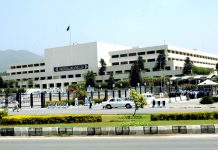Prime Minister Shehbaz Sharif on Wednesday reiterated his government’s commitment to transforming Pakistan’s agriculture sector through a series of sustainable reforms designed to increase productivity, reduce input costs, and strengthen rural economies.
Presiding over a high-level meeting on agricultural reform, the prime minister underscored that revitalizing the sector — which he called the backbone of the national economy — is essential for broader economic growth. He said the planned reforms would enhance per-acre yields, lower production costs, and foster mechanization across farmlands nationwide.
As part of the reform agenda, the premier directed authorities to gradually reduce taxes on agricultural machinery and tools, a move aimed at making modern equipment more accessible to farmers. He also ordered swift action to expand storage infrastructure for agricultural produce, addressing post-harvest losses and supply chain inefficiencies.
Shehbaz welcomed the financial contributions of provincial governments toward new agricultural initiatives, calling them critical to accelerating sector-wide development. He expressed hope that Pakistani students and scientists studying agriculture in China under scholarship programs would return not only as researchers but also as agri-entrepreneurs driving innovation and local growth.
The prime minister also announced that no new taxes will be levied on fertilizers or agricultural pesticides in the upcoming fiscal year — a step he said reflects the government’s resolve to support farmers by keeping input prices stable and manageable.
He emphasized that the agricultural uplift would directly improve the lives of farmers and rural communities, noting that productivity gains, infrastructure upgrades, and easier access to affordable credit were central to the government’s strategy.
During the session, officials briefed the prime minister on a set of core recommendations focused on boosting output, modernizing infrastructure, and improving access to low-interest agricultural loans. The meeting also reviewed the National Agriculture Innovation and Growth Action Plan, which targets income enhancement for farmers, increased exports of value-added agri-products, and system-wide reforms.
Participants were informed that under the National Technology Fund’s Ignite project, 129 agricultural startups have been launched to date, reflecting growing momentum in agritech and entrepreneurship.
Those attending the meeting included Federal Minister for National Food Security Rana Tanveer Hussain, Minister for Climate Change Dr. Musadik Malik, PM’s Chief Coordinator Musharraf Zaidi, Chief Agriculture Coordinator Ahmad Umair, as well as senior government officials and private sector stakeholders.























